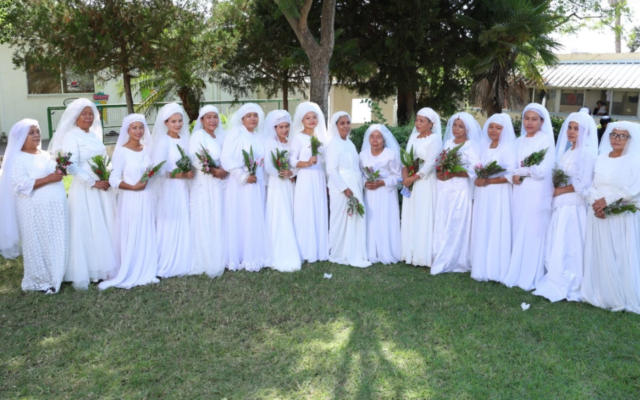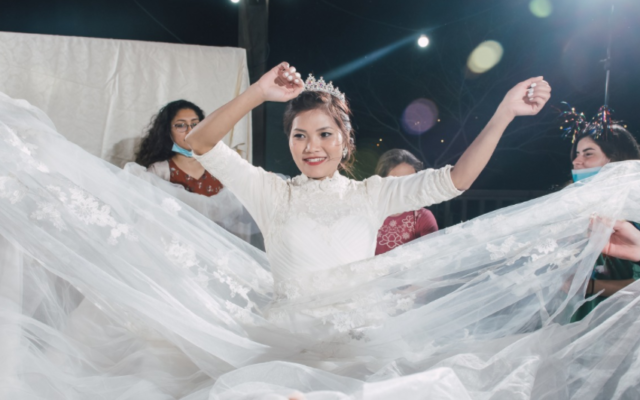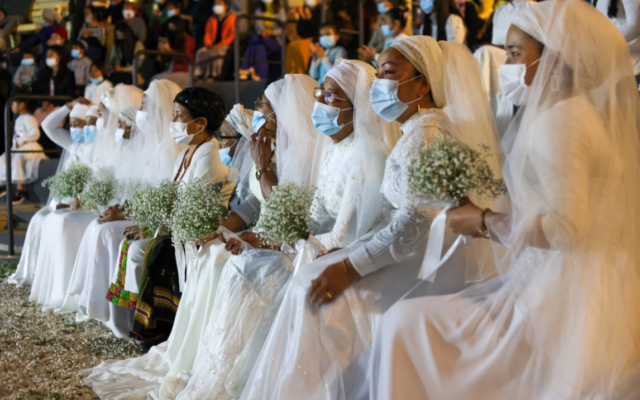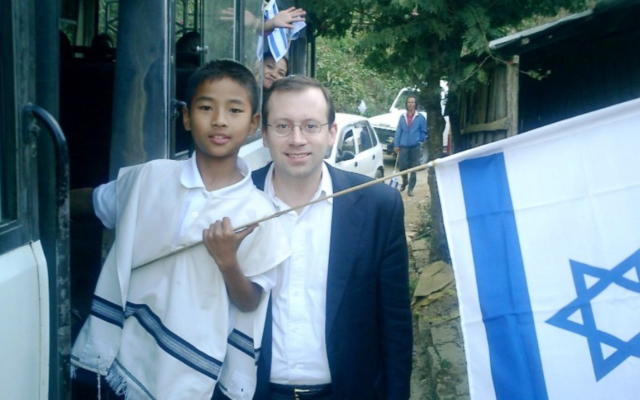Holy Land Ceremony Unites Seventeen Indian Couples
Members of the Bnei Menashe, a community said to be descended from the Lost Tribes, remarry in a formal ceremony in Israel.
Seventeen couples who emigrated to Israel from the Bnei Menashe community in Northern India were married in Israel in an Orthodox group wedding ceremony on Aug. 5.
All of the participating couples, who ranged in age from 29 to 79, had previously been married in India. Because the Chief Rabbinate of Israel does not formally recognize the Bnei Menashe of India as Jews, the group had to undergo a formal conversion process before they were married once again in Israel.

According to the Berman Jewish DataBank at Stanford University, only about 4,800 Jews are said to remain in India today, out of a total population of 1.35 billion. There has been a steady decline in numbers since the founding of Israel in 1948. Three years ago, the 2018 Atlanta Jewish Film Festival featured a historical documentary, “Shalom Bollywood,” about Indian Jews during the 1930s.
Among those saying their marriage vows again was 43-year-old Betzalel Haokip and his 41-year-old bride Bat Sheva. They were joined in the wedding ceremony by Betzalel’s father, Simeon, who is 73. He re-wed his wife — and Betzalel’s mother — Rachel, who is 64. Both couples were recent Bnei Menashe immigrants to Israel.
The group marriage took place in an absorption center run by Shavei Israel (“Returners of Israel”), an immigration nonprofit, near Netanya in central Israel. Shavei Israel was founded by Michael Freund, an American-born Israeli who made aliyah in 1995. Freund has worked to bring to Israel many isolated groups of Jews throughout the world who may have lost much of their identity through religious and political persecution. Among the Jewish communities the nonprofit has aided are those in China, El Salvador, and the island of Majorca off the coast of Spain.

Freund described the Indian couples his organization assists as having many reasons to be joyous. “After realizing their dream of making aliyah and returning to the Jewish people, these Bnei Menashe couples now have an additional reason to celebrate,” he said. “Despite the pandemic, they have now been remarried in a traditional Jewish wedding ceremony which symbolizes the new lives they are building here in the Jewish state.”
In a statement released by the organization, Israel’s Minister of Aliyah and Integration Pnina Tamano Shata said that the government has pledged to encourage immigration of Jews from all over the world. “This is a special community with a love of Israel in every sense,” she said, “a community that has kept the Jewish tradition for many years in faraway India and longs for the day when it will return to Zion.”
So far, 4,500 members of Bnei Menashe have moved to Israel, and there are hopes to bring the remaining members to Israel as well. The community traces its history back to the so-called ten Lost Tribes of Israel, who were dispersed following the Assyrian conquest of the Northern Kingdom of Israel in 721 BCE. Descendants of the tribes were said to have wandered as far as Central Asia before some eventually settled in the Indian villages of Manipur and Mizoram along the border with Myanmar — once known as Burma — and Bangladesh.
In the 19th century, many of them were converted to Christianity by Welsh missionaries, but in the latter part of the 20th century, the Bnei Menashe began to return to Judaism. They observed the Sabbath, kept kosher, celebrated Jewish holidays and followed the laws of family purity. In the 1970s, they began to petition the government of Israel for permission to emigrate under the Law of Return. Eventually their requests landed on the desk of Freund, who was working at the time in Prime Minister Benjamin Netanyahu’s public relations office. In 2005, Israel’s chief rabbinate recognized the community as part of the Lost Tribes, but required them to undergo conversion after making aliyah.

There are several distinct Indian communities who consider themselves Jews. One community settled in Cochin after fleeing persecution elsewhere in Southern India. Another, calling itself Bene Israel, settled in the eastern city of Mumbai, formerly known as Bombay. They were joined in the 19th century by Baghdadi Jews from Iraq and other Muslim lands northwest of India, including Turkey, Syria, Iran and Afghanistan. The Bene Israelis and Cochin Jews were very successful, rising to prominence in the colonial government and armed forces under the British prior to 1947. The Sassoon family of Bombay, originally Baghdadi Jews from Iraq, were often called the “Rothschilds of the East” for their immense wealth and the influence they wielded in Asia, the Middle East and the Indian sub-continent.
Meanwhile, back in India, some 6,000 Bnei Menashe await their return to the Jewish homeland.
- Wedding
- Weddings
- India
- Marriage
- Ceremony
- Aliyah
- Israel
- Bob Bahr
- Bnei Menashe
- Shavei Israel
- Michael Freund
- Cochin Jews
- Baghdadi Jews
- Bene Israel
- Mumbai
- Berman Jewish DataBank at Stanford University
- Chief Rabbinate of Israel
- Atlanta Jewish Film Festival
- Shalom Bollywood
- Betzalel Haokip
- Bat Sheva
- China
- El Salvador
- Majorca
- Spain
- pandemic
- Israel Minister of Aliyah and Integration
- Pnina Tamano-Shata
- Lost Tribes of Israel
- STYLE Magazine
- Benjamin Netanyahu
- Simeon Haokip
- Rachel Haokip




comments